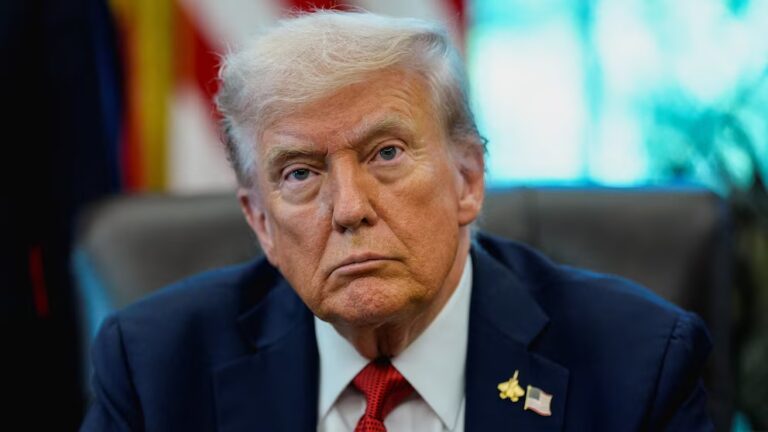
With Congress out of session, relatively little officially happened this week in American politics, leaving the ghosts of past events to dominate the scene. The massacre in Parkland, Florida, continued to lead the agenda and spurred the Trump administration to roll out a set of new proposals — some pro-gun and some in the direction of gun control — though the actual prospects for anything happening remain very uncertain.
Robert Mueller’s investigation continues to move forward, sweeping more people into its wake, and so does the administration’s regulatory war on the Affordable Care Act. Meanwhile, the Pennsylvania Supreme Court handed down a ruling that could prove decisive in November’s battle for control of Congress.
Here’s what you need to know.
President Trump endorsed some gun reforms
Facing increased public pressure in the wake of the mass shooting at Marjory Stoneman Douglas High School in Parkland, Florida, the Trump administration rolled out some new policy ideas — including, strikingly for a Republican, a few ideas that would restrict gun rights:



- Limited steps toward gun control: Trump signed a memo ordering the attorney general to take steps toward banning bump stocks, and expressed support for both the Fix NICS Act, which would tighten background checks, and raising the age limit for assault weapons ownership to 21.
- Also wants more guns in school: In a confusing series of tweets, Trump first angrily denied that he wanted to “give teachers guns” and then outlined a plan to give teachers guns, which he said would deter school shootings.
- What’s next? A Republican president who wanted to vigorously whip up congressional support for mild gun control measures could probably get it done, but it’s far from clear that Trump plans to actually follow through with any of this. GOP congressional leaders won’t be inclined to move gun bills that inevitably divide their caucus to the floor without strong external impetus.
Robert Mueller’s investigation heated up
Special counsel Robert Mueller followed up Friday’s indictment of more than a dozen Russian individuals and entities with the announcement of a guilty plea from former Skadden Arps attorney Alex van der Zwaan for making false statements to the FBI, and then another one from Rick Gates. The Russians almost certainly won’t ever stand trial (they are in Russia), and van der Zwaan is a very peripheral player, but both moves suggest an intensifying effort to raise pressure on the actual key figures in the case.



- Squeezing Paul Manafort: The van der Zwaan charges arise from his communications with Gates, a former deputy campaign manager on the Trump campaign and longtime business partner of Paul Manafort. His plea seems to have raised the legal pressure on Gates, who in turn has now pleaded guilty, which raises the pressure on Manafort.
- The significance of the Russian indictments: The charges against the Russians, meanwhile, seem mostly designed to introduce the existence of a Russian influence campaign into the legal system — creating a potential hook for future conspiracy charges involving Americans.
- What’s next? Genuinely nobody knows. One of the most striking aspects of the Mueller investigation so far is that many of its key moves have taken journalists by surprise. Very little is leaking, and the special counsel seems to put a high degree of value on secrecy.
HHS is undermining the Affordable Care Act
New regulations promulgated on Tuesday by the Department of Health and Human Services are going to greatly expand insurance companies’ ability to opt out of Affordable Care Act regulatory requirements, likely offering lower premiums to healthy young buyers but making actual access to health care for people who get sick more difficult.
- The long short term: The Obama administration allowed insurance companies to sell skimpy “short-term” insurance plans to cover small gaps in coverage, but the Trump administration is going to expand the meaning of “short term” to cover a full year.
- Preexisting conditions are back: Insurers will be able to deny coverage to people with preexisting conditions on these short-term plans, meaning a better deal for those who don’t have any preexisting conditions — but that will drain the regular market of many customers, leaving those with significant health care needs facing higher costs.
- Democrats moving beyond Obamacare: The political impact of Trump’s regulatory drive is to persuade more and more Democrats that the ACA has failed to land at a stable compromise. Democrats have plenty of internal disagreements about the path forward on health care, but they now all broadly center on expanding and enhancing Medicare and Medicaid rather than editing private insurers.
Pennsylvania got a new congressional map
In the wake of an earlier decision to deem partisan gerrymandering a violation of the state constitution, the Pennsylvania Supreme Court drew a new, more balanced map for its US House of Representatives districts that is cheering Democrats and angering Republicans.



- A balanced map: The new Pennsylvania map makes a bunch of small, subtle choices that favor Democrats but in a big-picture sense maintains a slight pro-GOP lean for the sake of compactness. The state split essentially 50-50 between Hillary Clinton and Donald Trump, but Trump carried most of the districts on the new map.
- A big boost to Democrats: Nevertheless, relative to the old map, the new map is a huge gift to Democrats that could net them two or three extra congressional seats.
- What’s next? Republicans have vowed to sue in federal court and, conceivably, could prevail there, though prior rulings make it unlikely that federal courts would overrule a state court on this kind of question of state constitutional interpretation.
Sourse: vox.com






